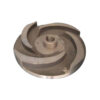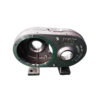مروحة من الفولاذ المقاوم للصدأ
مروحة من الفولاذ المقاوم للصدأ
ال مروحة من الفولاذ المقاوم للصدأ صُممت هذه المروحة لتحقيق كفاءة عالية ومقاومة للتآكل في التطبيقات الصناعية الصعبة. وبفضل هندستها المتينة والدقيقة، تضمن المروحة المصنوعة من الفولاذ المقاوم للصدأ أداءً موثوقًا وتوفيرًا في الطاقة في أنظمة السوائل.
ال مروحة من الفولاذ المقاوم للصدأ صُممت هذه المروحة لتحقيق كفاءة عالية ومقاومة للتآكل في التطبيقات الصناعية الصعبة. وبفضل هندستها المتينة والدقيقة، تضمن المروحة المصنوعة من الفولاذ المقاوم للصدأ أداءً موثوقًا وتوفيرًا في الطاقة في أنظمة السوائل.
- أكثر من 60 نوعًا من المواد، وأكثر من اثني عشر سبيكة، و70 نوعًا من الأرقام.
- يمكن إنتاج العديد من المنتجات، أكثر من 3500 قالب صب دقيق، وأكثر من 1000 قالب صب رملي.
- يمكن أن تكون ملحقات الإنتاج كبيرة أو صغيرة.
- يمكن تخصيص منتج واحد يصل وزنه إلى 50 كجم.
- تتوفر أفران متعددة للاختيار من بينها، ويمكن إنتاج قطع فردية يتراوح وزنها بين 50 كجم إلى 850 كجم.
- 20 عامًا من الخبرة الغنية والماجستير، دخل الصناعة في الثمانينيات، وأصبح قائدًا في الصناعة.
- المنتجات قابلة للتتبع، وكل منتج من منتجات الفرن لديه شهادة: 3.1 شهادة المواد.
- يمكن للعملاء أن يطلبوا من وكالة اختبار خارجية إصدار شهادة 3.2.
- يمكن إصدار شهادة معالجة للمنتجات الجيدة.
مزايا شركة Leierwo في صب المسبوكات الدقيقة في صناعة صب المضخات
تتطلب منتجات المضخات عادةً دقة صب عالية وخصائص مادية عالية، وتتمتع شركة لييروو بخبرة واسعة في صب المضخات. يُظهر تطبيق الشركة الواسع في ملحقات المضخات والصمامات إتقانها لعملية صب المكونات الرئيسية، مثل أجسام المضخات، والدوافع، والأكمام. تتحكم تقنية الصب الدقيق بفعالية في تناسق سمك جدار الصب ودقة التجويف الداخلي، مما يُقلل من عمليات المعالجة اللاحقة ويُحسّن الكفاءة الكلية. علاوة على ذلك، تُوصي الشركة بعملية الصب الأنسب بناءً على بنية المكونات، لتحسين أداء منتجات المضخات بشكل أكبر، وتلبية متطلبات مقاومة التآكل والحرارة وديناميكيات السوائل في مختلف الصناعات.
اختيار المواد الرئيسية
تتعرض مصبوبات المضخات للوسط السائل لفترات طويلة، وغالبًا ما تواجه تحديات مثل التآكل والتلف والتجويف. لذلك، يجب أن تتمتع هذه المواد بمقاومة عالية للتآكل والتلف، بالإضافة إلى خصائص صب ممتازة.
المواد الشائعة:
سلسلة الفولاذ المقاوم للصدأ:
316/316L: يُفضّل استخدامه لأغلفة المضخات، والمراوح، والأعمدة، فهو مقاوم للأحماض والقلويات وتآكل أيونات الكلوريد. فولاذ دوبلكس 2205: عالي القوة ومقاوم للتآكل، ومناسب لمضخات مياه البحر والمضخات الكيميائية. 304/304L: مكونات مضخات متعددة الأغراض، ومناسبة لمعالجة المياه وصناعة الأغذية. سلسلة الفولاذ الكربوني:
1045: لأعمدة المضخات وأغلفتها في البيئات غير المسببة للتآكل. 4130: للمكونات الهيكلية للمضخات عالية الحرارة وعالية الضغط.
سلسلة السبائك الخاصة:
C95400 برونزي: مناسب لأكمام مضخة مياه البحر والمكونات المنزلقة، ويوفر مقاومة ممتازة للتآكل والتشحيم الذاتي.
سبائك الكوبالت (مثل Co6): تستخدم لإغلاق الأسطح أو المكرهات في المضخات عالية التآكل وعالية الحرارة.
خيارات خدمة صب المفاتيح
يعتمد أداء ديناميكيات السوائل لمكونات المضخة (مثل المكرهات وأجسام المضخة) على دقة الصب، وهذا النوع من الخدمة لديه تقسيم واضح للعمل!
الصب الاستثماري: يُهيمن على أجزاء مسار التدفق المعقدة. يُعدّ الدافع قلب المضخة، ويتميز انحناء شفرته (الذي يجب أن يتوافق مع تصميم ديناميكيات السوائل) بشكل معقد. تُقلل الانحرافات البعدية بشكل مباشر من كفاءة المضخة. يُمكن للصب الاستثماري تحقيق دقة في شكل الشفرات تبلغ +0.1 مم، وتشطيب سطحي لا يتجاوز Ra3.2um، مما يُقلل من مقاومة السوائل.
الصب الرملي: يُستخدم في تصنيع المكونات الأساسية مثل هيكل المضخة. يتميز هيكل المضخة، كغلاف خارجي، بشكل منتظم نسبيًا (أسطواني أو مربع في الغالب). في الإنتاج الضخم، يتميز الصب الرملي بتكلفة منخفضة ودورات إنتاج قصيرة، مما يُلبي المتطلبات الأساسية للدعم الهيكلي ومرور السوائل.
التصنيع باستخدام الحاسب الآلي: يضمن دقة النقل والإغلاق. يتطلب الوصل بين عمود المضخة والمروحة، بالإضافة إلى سطح الإغلاق بين جسم المضخة والغطاء الطرفي، تصنيعًا باستخدام الحاسب الآلي لضمان مركزية (≤ 0.01 مم) واستواءً لمنع الاهتزاز أو التسرب الناتج عن الانحراف أثناء التشغيل.








